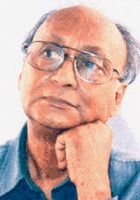Summer Poem by Jayanta Mahapatra
Summer
Not yet.
Under the mango tree
The cold ash of a deserted fire.
Who needs the future?
A ten-year-old girl
combs her mother's hair,
where crows of rivalries
are quietly nesting.
The home will never
be hers.
In a corner of her mind
a living green mango
drops softly to earth.
Summer is one of those typical poems of Jayanta Mahapatra wherein he clutches along so many ideas and images to present his thesis and anti-thesis as George Bernard Shaw is in his talks and dramas of ideas and Samuel Beckett incorporating in the existential and absudistic things into the plays of his to dip into the absurdities of life and the world. What the purpose of life, who can but say it? Why are we here? A poet who is so private and personal, intricate and complex, linguistic and imagistic frolicking with word-play here in this poem takes to feminism, fatalism and palmistry, bare realism, rural landscape, Indian poverty and the gusts of summer ruffling it all with the scorching heat and dust, the sun falling so strong and the earth parching, people perspiring. Against the back drop of all this, he portrays the life of the little girl seeing the lousy hair of her mother in the mango orchard, seeking for relief from the scorching summer. Poverty, illiteracy, underdevelopment and life under impoverished circumstances form the crux of his poetry and the present poem is no exception to that. Taking summer, he says many a thing, somewhere about the good wife taking a siesta by being unaware of the pyre burning far and the choric voices coming to, his sexuality and also about the passing of heat and humidity under the mango tree. Somewhere he has described the Vedic and Upanishadic chants doing the rounds in the rock-built classical temples seconded by the movement of the crocodiles deep into the waters.
A nice comparison, , , , , , , , The images of summer at its best through this poem.10++
This poem has not been translated into any other language yet.
I would like to translate this poem
Summer by Jayanta is just like A Summer Poem written by him, but is different in some ways. It is the specialty of the poet that he chooses very often the same title to express it differently and similar is the case with this poem. An Indian summer poem, it is more of rural life and the country, the hamlets and thorps burning in scorching heat and summer with mother and daughter sitting in the orchard and that too under the mango tree forms the scene of the poem under our scrutiny and perusal. The secluded country with the hamlets and thorps and the mango groves portrayed against the burning sensation, scorching heat form the scenic background of the poem.